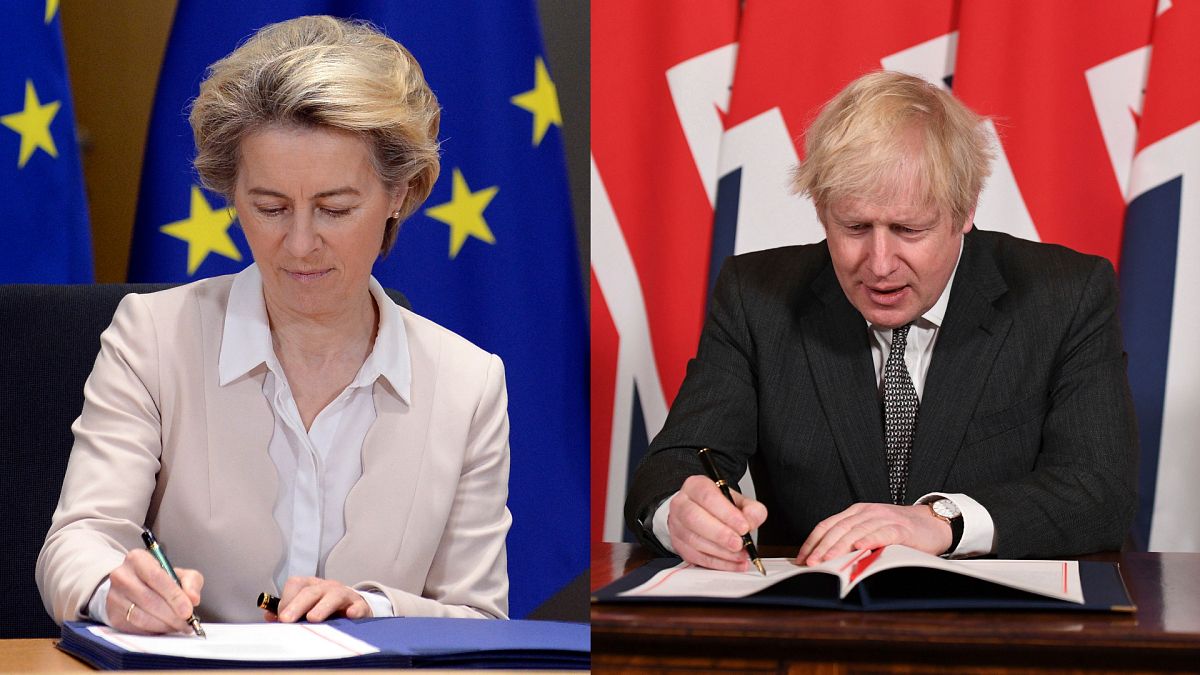Charles Michel and Ursula von der Leyen signed the Brexit trade deal on behalf of the EU before PM Boris Johnson put his name to it for the UK.
The long-awaited post-Brexit trade deal has been signed by EU heads and was overwhelmingly approved by British MPs.
UK lawmakers backed the agreement on Wednesday afternoon by 521 votes to 73.
Officially called the EU-UK Trade and Cooperation Agreement, it has taken months of negotiation to agree.
European Council President Charles Michel and European Commission President Ursula von der Leyen signed on behalf of the European Union on Wednesday morning (see video player, above).
It was then flown to London by a Royal Air Force plane where Prime Minister Boris Johnson signed for the UK at 10 Downing Street.
'Time to put Brexit behind us'
“The agreement that we signed today is the result of months of intense negotiations in which the European Union has displayed an unprecedented level of unity,” Michel said.
“It is a fair and balanced agreement that fully protects the fundamental interests of the European Union and creates stability and predictability for citizens and companies," he added.
Von der Leyen stressed after signing the document that "it has been a long road" to get a Brexit trade deal.
"It's time to put Brexit behind us," she added.
European leaders have welcomed the deal, describing it either as a moment of "historical importance", an "important milestone", or a "major step forward".
But most have also reiterated warnings that despite the deal, changes to the current relationship will come into force on January 1.
'A thin deal is better than no deal'
Hours later, the UK Parliament overwhelmingly approved the trade agreement by a majority of 448.
It was backed by the ruling Conservative party — including the eurosceptic European Research Group — as well as the main opposition Labour party.
Keir Starmer, Labour's leader, said in his address prior to the vote that he had instructed his MPs to vote for the deal, despite it being "imperfect" and "thin" because "this treaty is the only way to ensure that we avoid no deal".
"A thin deal is better than no deal and not implementing this deal would mean immediate tariffs and quotas with the EU which will push up prices and drive businesses to the wall. It will mean huge gaps in security, a free for all on workers' rights and environmental protections and less stability for the Northern Ireland Protocol.
"So we will vote for this Bill today but I do hope that this will be a moment where our country can come together and look to a better future," he added.
Smaller opposition parties including the Scottish National Party, the Liberal Democrats and Northern Ireland's Democratic Unionist Party (DUP) voted against.
Johnson signed the treaty after the vote, saying that by doing so "we fulfill the sovereign wish of the British people to live under their own laws, made by their own elected Parliament".
The agreement eventually needs approval from the EU’s legislature, which is not expected to take up the deal for weeks.
The leaders of the European Parliament’s political groups said they would not seek full approval until March because of the specific and far-reaching implications of the agreement.
The overwhelming expectation is that EU lawmakers will approve the deal.
What is being signed?
Three separate agreements have been signed. Their full names are as follows:
Trade and Cooperation Agreement between the European Union and the European Atomic Energy Community and the United Kingdom of Great Britain and Northern Ireland.
Agreement between the European Union and the United Kingdom of Great Britain and Northern Ireland concerning security procedures for exchanging and protecting classified information.
Agreement between the Government of the United Kingdom of Great Britain and Northern Ireland and the European Atomic Energy Community for Cooperation on the Safe and Peaceful Uses of Nuclear Energy.
Two copies of each agreement will be signed. Once both parties have put their names to the documents, one of the two original copies of each agreement will be sent to the EU where they will go to the Archives of the Council and the other to the United Kingdom.
